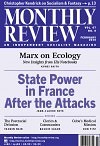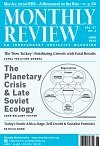Ecology
We have finally reached the point where most people around the world believe that climate change is really happening. Almost a decade ago, the landmark report by Nicholas Stern sparked a fierce debate among economists, not over whether climate change was real, but over the costs of addressing it. In the years since, the Intergovernmental Panel on Climate Change (IPCC) has published further alarming reports on projected future global temperatures, rates of glacial melting, and sea levels. Most recently, last December saw an unprecedented agreement by nearly 200 countries at the Paris climate summit to take steps to address the problem.… My concern here is therefore not to continue making the case for the reality of climate change, but instead to show how that reality is portrayed—and distorted—in the mainstream media, with behind-the-scenes assistance from orthodox economic analysis. | more…

From mainstream news reports, one might easily conclude that the Paris climate agreement, presented to the world on December 12, 2015, was a complete triumph. The Guardian headlined it as “The World’s Greatest Diplomatic Success.” However, by any meaningful criteria, the Paris climate change agreement was fraudulent, based on a fabric of illusion. Moreover, the distorted media coverage of the climate deal, presenting it as a historical agreement virtually without shortcomings, was made possible in large part by the French government’s banning of the mass climate protests, following the November 2015 terrorist attacks in Paris. With radical protestors silenced and their demands marginalized, the global power elite could make virtually any public claims it wished, without acknowledging any other public voice or alternative view. | more…
Karl Marx has long been criticized for his so-called ecological “Prometheanism”—an extreme commitment to industrialism, irrespective of natural limits. This view, supported even by a number of Marxists, such as Ted Benton and Michael Löwy, has become increasingly hard to accept after a series of careful and stimulating analyses of the ecological dimensions of Marx’s thought, elaborated in Monthly Review and elsewhere. The Prometheanism debate is not a mere philological issue, but a highly practical one, as capitalism faces environmental crises on a global scale, without any concrete solutions. Any such solutions will likely come from the various ecological movements emerging worldwide, some of which explicitly question the capitalist mode of production. Now more than ever, therefore, the rediscovery of a Marxian ecology is of great importance to the development of new forms of left strategy and struggle against global capitalism.… Yet there is hardly unambiguous agreement among leftists about the extent to which Marx’s critique can provide a theoretical basis for these new ecological struggles.… This article… [takes] a different approach… [investigating] Marx’s natural-scientific notebooks, especially those of 1868, which will be published for the first time in volume four, section eighteen of the new Marx-Engels-Gesamtausgabe(MEGA). | more…
Common Fonts of a Great Transition
To link Marxism and ecological transition may seem at first like trying to bridge two entirely different movements and discourses, each with its own history and logic: one having mainly to do with class relations, the other with the relation between humans and the environment. However, historically socialism has influenced the development of ecological thought and practice, while ecology has informed socialist thought and practice. Since the nineteenth century, the relationship between the two has been complex, interdependent, and dialectical.… This essay unearths the deep ecological roots of Marx’s thought, showing how he brought an environmental perspective to bear on the overarching question of social transformation. From there it traces the evolution of Marxian ecology, illuminating its profound, formative link to modern ecological economics and systems ecology. It concludes with the wider project of building the broad and deep social movement required to halt and reverse ecological and social destruction. | more…
Pope Francis’s “ecological encyclical” is an event which—whether taken from a religious, ethical, social, or political point of view—is of planetary importance. Considering the enormous influence of the Catholic Church worldwide, it is a crucial contribution towards the development of a critical ecological consciousness. It was received with enthusiasm by the true defenders of the environment; however it aroused uneasiness and rejection among religious conservatives, representatives of capital, and ideologues of “market ecology.” It is a document with a great richness and complexity, one that proposes a new interpretation of the Judeo-Christian tradition, a rupture with the “promethean dream of dominion over the world,” and a profoundly radical reflection on the causes of the ecological crisis. Many aspects of liberation theology…can be seen as a source of inspiration here, particularly the inseparable.… In the following brief notes, I am interested in emphasizing the aspect of the encyclical that explains the resistance it has found in the economic and media establishment: its anti-systemic character. | more…
Lucia Pradella, Globalization and the Critique of Political Economy: New Insights from Marx’s Writings (London: Routledge, 2015), 218 pages, $160, hardback.
In 2012, the second section of the new historical-critical edition of Marx and Engels’s complete writings, the Marx-Engels-Gesamtausgabe (MEGA), was finally completed, and all the editions and manuscripts of Capital became available in order to trace Marx’s own theoretical development and Engels’s editorial works. The remaining three sections are, however, only halfway completed, and it will likely take at least another twenty years before all the work is finished.… What is more, a great number of them are Marx’s journal fragments and excerpts, which have not yet been published in any language. In this sense, the distinct importance of continuing the MEGA project is the further publication of these unknown notebooks, which promise to reveal Marx’s unfinished undertaking, the critique of political economy.… It is therefore no coincidence that a new trend has emerged in the last few years of scholars studying Marx’s notebooks. Works like Kevin Anderson’s Marx at the Margins, Heather Brown’s Marx on Gender, and my own article on Liebig in Monthly Review have shown the underestimated theoretical dimensions of anti-colonialism, gender, and ecology in Marx’s thought. | more…
Marxism and "System Change Not Climate Change"
Humanity today is confronted with what might be called the Great Capitalist Climacteric. In the standard definition, a climacteric (from the Greek klimaktēr or rung on the ladder) is a period of critical transition or a turning point in the life of an individual or a whole society. From a social standpoint, it raises issues of historical transformation in the face of changing conditions. In the 1980s environmental geographers Ian Burton and Robert Kates referred to “the Great Climacteric” to address what they saw as the developing global ecological problem of the limits to growth…. I will use the term the Great Capitalist Climacteric here to refer to the necessary epochal social transition associated with the current planetary emergency. It refers both to the objective necessity of a shift to a sustainable society and to the threat to the existence of Homo sapiens (as well as numerous other species) if the logic of capital accumulation is allowed to continue dictating to society as a whole. The current world of business as usual is marked by rapid climate change, but also by the crossing or impending crossing of numerous other planetary boundaries that define “a safe operating space for humanity.” | more…
Sven Beckert, Empire of Cotton: A Global History (New York: Knopf, 2014), 640 pages, $35, hardback.
For four years following the 2008 mortgage crisis, I worked as a cotton merchant for one of the “big four” trading firms—ADM, Bunge, Cargill, and Louis Dreyfus. These shadowy giants, two of them privately held, maintain oligopoly control of agricultural commodity markets. From desks in Memphis, my colleagues and I purchased mountains of cotton in Asia, Africa, and the Americas, warehoused it, speculated on it, and sold it back to mills on those same continents.… We sat at the pinnacle of a web of political and economic forces that funneled cotton into facilities we owned and cash into our accounts, but nowhere in the office was there a visible sign of the violence that made it all possible.… Too often liberal histories focus on a single period, territory, or class perspective, and end up obscuring the truth, severing the threads that tie a moment to its historical roots. Sven Beckert’s Empire of Cotton is different. Although a liberal historian, Beckert refuses to limit his scope in the traditional way. Instead, he follows the movement of cotton across time, space, and class, bringing forward the threads that bind the objects of an otherwise distorted past. | more…
Science and the Struggle for Change
In the short time available to me in this talk it is impossible to go too far with a discussion of the state of ecological Marxism as I understand it. However, I plan to discuss briefly a significant feature of the program of ecological Marxist analysis and practice of which I consider myself a part. Specifically, I will discuss the methodological commitments responsible for much of the strength and insight of the ecological Marxism associated with what John Bellamy Foster has called the “third stage of ecosocialism research…in which the goal is to employ the ecological foundations of classical Marxian thought to confront present-day capitalism and the planetary ecological crisis that it has engendered—together with the ruling forms of ideology that block the development of a genuine alternative.” This, I believe, will interest scholars and activists working toward a deeper understanding of the world with the ultimate goal of changing it, and should interest those involved in debates regarding Marxian theory and praxis. | more…
As we veteran activists of the 1960s and early ’70s enter our años del retiro, it is time for reflection, summation, and most importantly sharing what we have learned with those reaching to grab the baton. Many of us, now grandparents, are getting questions from our grandkids and kids about our lives in the “golden age” of U.S. social movements. … Bill Gallegos has been an activist since the 1960s, when he became involved in Crusade for Justice, a revolutionary Chicano nationalist organization. He has since emerged as a leading socialist environmental justice activist, and is the former executive director of Communities for a Better Environment. | more…
The word Anthropocene, unknown twenty years ago, now appears in the titles of three academic journals, dozens of books, and hundreds of academic papers, not to mention innumerable articles in newspapers, magazines, websites, and blogs. There are exhibitions about art in the Anthropocene, conferences about the humanities in the Anthropocene, and novels about love in the Anthropocene. There is even a heavy metal album called The Anthropocene Extinction. Rarely has a scientific term moved so quickly into wide acceptance and general use.… Behind what might appear to be just a trendy buzzword are important scientific discussions that have radical implications for the future of life on Earth. | more…

In two Monthly Review special issues, “Education Under Fire: The U.S. Corporate Attack on Students, Teachers, and Schools” (July-August 2011) and “Public School Teachers Fighting Back” (June 2013), we sounded an alarm regarding the rapid restructuring and privatization of U.S. K–12 public schools. In terms of the scale of nationwide restructuring, the corporate takeover of education is unprecedented in modern U.S. history. The closest comparison we can come up with is the destruction of the street car systems across the United States and the building of the interstate highway system—in which freeways went right through cities for the first time, often in the face of neighborhood and community resistance. With respect to K–12 education, unimaginable amounts of private funds have gone into pressuring and corrupting government at every level, while the control mechanisms of the new educational system are increasingly left in private, not public, hands. The Common Core Standards and related high-stakes tests are at the center of this new system, and are the product of private corporate groups outside the direct reach of government. | more…

